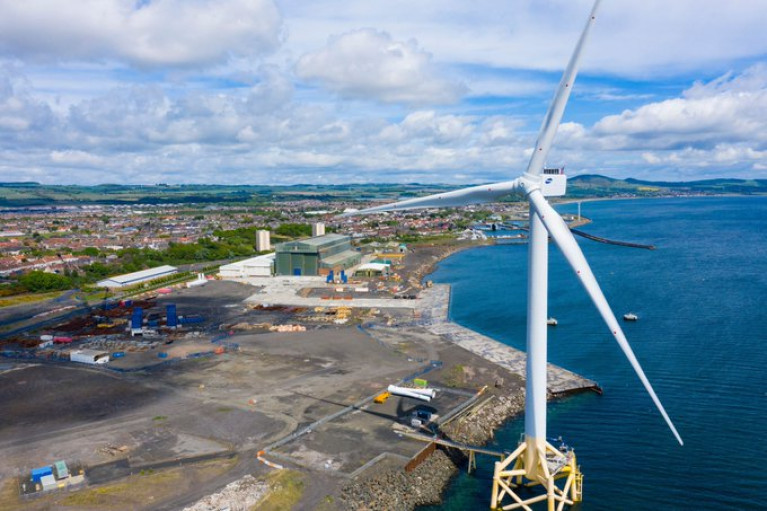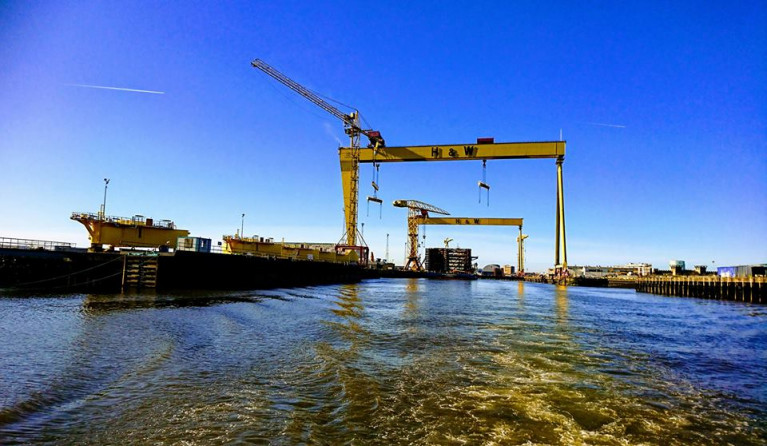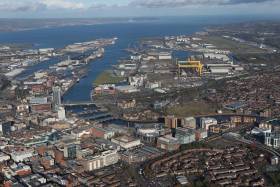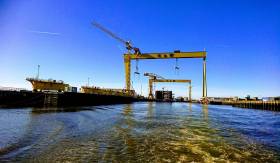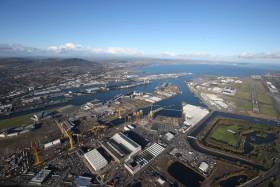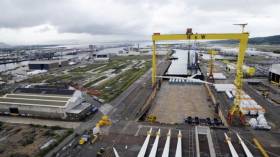Displaying items by tag: Harland & Wolf
Contract for Five-Year Subsea Infrastructure Fabrication Work to Take Place at Harland & Wolff (Arnish) Scotland
Shipyard group, Harland & Wolff has signed a five-year Master Services Agreement for the fabrication of large structures at one of their two Scotland based yard sites.
The contract is with a global oil services company supplying subsea infrastructure across the globe and the work is to take place at Harland & Wolff (Arnish) where the yard is located on the Isle of Lewis off the west coast.
H&W has now received its first purchase order under that agreement to fabricate six subsea structures with a contract value of around £3 million. These highly specialised structures are used in oil and gas platforms and the surrounding infrastructure. Each is capable of withstanding pressures of 430 bar (6,235 psi).
The structures will be built over the next 18 months at the company's Arnish site in a staged delivery programme with an expected completion date in 2025.
Welcoming the contract, John Wood, CEO of Harland & Wolff Group Holdings, said: "I am delighted that Arnish is recognised as a centre of excellence to deliver critical subsea infrastructure.
“This contract marks a significant step for Harland & Wolff, and builds on the highly technical work the yard has already undertaken on suction anchors, piles and the work it is currently performing for the Floating Production Storage and Offloading (FPSO) platform vessel the SeaRose FPSO."
“These specialised subsea structures are a new product area for us and we expect that successful delivery of this contract will open up significant opportunities for additional contracts in subsea infrastructure in the future.”
The work on the SeaRose FPSO, Afloat adds is taking place at Harland & Wolff (Belfast), the group's largest shipyard facility.
Harland & Wolff Group Awarded £61 million Contract for Floating Production Storage and Offloading (FPSO) Vessel
The Belfast based shipyard Harland & Wolff has today announced that it has been awarded a £61m base contract to deliver the mid-life upgrade contract of the Floating Production Storage and Offloading (FPSO) vessel, the MV Sea Rose.
The contract is with Cenovus Energy, an international integrated oil and natural gas company headquartered in Calgary, Canada, with a market capitalisation of circa CA$54bn.
Sea Rose is expected to arrive at the company’s Belfast Yard in early 2024 and will be in the Building Dock for over three months. This will be the second time that Harland & Wolff has welcomed the FSPO vessel to Belfast, the previous visit being in 2012. This recent experience coupled with the ability to apply the latest technologies and innovations to the vessel upgrade helped to win the major contract for the group.
Several pre-arrival works have already commenced in Belfast, these include inspections, procurement of steel, fabrication of customised blocks and other dry dock operations. Further fabrication has begun to ensure the yard is fully prepared to commence refurbishment and upgrade works effectively and efficiently as soon as the vessel arrives next year.
It is expected that 1,000 personnel will be on-site in Belfast, allowing synergy between programmes as Harland & Wolff continues to ramp up to deliver the £1.6bn Fleet Solid Support programme as part of Team Resolute.
John Wood, CEO of Harland & Wolff Group Holdings plc, comments: “I am delighted that Cenovus has chosen Harland & Wolff as its preferred yard to undertake the mid-life upgrade of the SeaRose.
This is a significant win within our non-defence portfolio from a global, blue-chip energy group and I am pleased that we are gaining a reputation as a go-to yard for large and complex programmes. With an estimated 1,000 personnel on-site, this project will allow for further synergies in our execution, leveraging off of personnel, skill sets and supply chains that will support the upcoming FSS Programme.”
With a history stretching back over 160 years, today Harland & Wolff is a multisite fabrication company, operating in the maritime and offshore industry. It does this through five markets: commercial, cruise and ferry, defence, energy and renewables and six services: technical services, fabrication and construction, decommissioning, repair and maintenance, in-service support and conversion.
Its Belfast yard is one of Europe’s largest heavy engineering facilities, with deep water access, two of Europe’s largest drydocks, ample quayside and vast fabrication halls. As a result of the acquisition of Harland & Wolff (Appledore) in August 2020, the company has been able to capitalise on opportunities at both ends of the ship-repair and shipbuilding markets where there is significant demand.
In February 2021, the company acquired the assets of two Scottish-based yards along the east and west coasts. Now known as Harland & Wolff (Methil) and Harland & Wolff (Arnish), these facilities will focus on fabrication work within the renewables, energy and defence sectors.
In addition to the four yards, Harland & Wolff also owns the Islandmagee gas storage project, which is expected to provide 25% of the UK’s natural gas storage capacity and to benefit the Northern Irish economy as a whole when completed.
Harland & Wolff Shipyard Successfully Completes First Barge in Belfast
Harland & Wolff has successfully completed the first hull for the Cory Barges fabrication contract at its iconic Belfast shipyard.
Marking the first major milestone for this contract, Cory has approved the hull, and this will now pass into the painting hall before its delivery in the coming months. The second barge will soon be completed, whilst works on the next two barges are also well advanced. Fabrication is now being conducted simultaneously on all barges throughout the production hall with numerous workstations set up and the project team tracking progress on a daily basis with the newly implemented ERP (enterprise resource planning) technology.
 Fabrication is now being conducted simultaneously on all the Cory barges at Harland & Wolff Shipyard Photo: David Cordner
Fabrication is now being conducted simultaneously on all the Cory barges at Harland & Wolff Shipyard Photo: David Cordner
The work being undertaken on these barges has supported the facility in ramping up the workforce numbers and advancing vital shipyard skills which will be required for the recently awarded £1.6 billion Fleet Solid Support warship programme, of which Harland & Wolff will be responsible for delivering works worth around £700 million to £800 million through the life of the programme. It will last seven years and commence in 2023, bringing long-term employment and opportunities until 2031.
John Wood, Group Chief Executive Officer, Harland & Wolff, comments:
"It is fantastic to walk round the fabrication halls in Belfast and see them being a hive of activity, with our apprentices putting into practice the skills they have learned from our experienced workforce. It has been fascinating to watch the adoption of new technology with our twin headed robotic welding line delivering production improvements by a magnitude of four to six times against conventional production and welding methods. I am very encouraged with the progress being made and it is the perfect stepping stone towards full scale shipbuilding."
Harland & Wolff Sign Framework Agreement with the RNLI
Harland & Wolff, the iconic shipyard with over 160 years of maritime and offshore engineering pedigree, is delighted to announce it has signed a framework agreement with the Royal National Lifeboat Institution (RNLI) for the haul-out, repairs, maintenance, refurbishment and associated works for the RNLI's fleet of lifeboats.
Under the terms of this framework agreement, Harland & Wolff (Appledore) will be responsible for the repairs, maintenance and other works programmes defined by RNLI for its fleet of lifeboats and other vessels. This agreement will span multiple years and each docking will be priced as a bespoke agreement based on the scope of works required to be performed on each vessel.
As part of this agreement, Harland & Wolff will also support the RNLI with free bi-annual haulouts and wash down of its Appledore lifeboat.
The RNLI currently has a fleet of 431 lifeboats and 238 lifeboat stations that will require repairs and maintenance on a regular basis in order to keep them active and ready for deployment. Its Appledore yard will be working in conjunction with RNLI's internal team to perform defined works programmes.
John Wood, Group CEO of Harland & Wolff, commented: "I am delighted that Appledore has signed this framework agreement with the RNLI. The RNLI is a much-respected institution, and we are privileged to be hosting its vessels at Appledore. Our capacity, capability and proximity to the RNLI's main centres of activity has been crucial to the award of this contract. This, once again, demonstrates that our strategy to be geographically diverse in order to attract local business is sound and bearing fruit. I look forward to a long-standing and growing relationship with the RNLI in the months and years ahead and will be looking at opportunities to support them, not only from Appledore, but also from all our sites across the UK."
Harland & Wolff is a multisite fabrication company, operating in the maritime and offshore industry through five markets: commercial, cruise and ferry, defence, energy and renewables and six services: technical services, fabrication and construction, decommissioning, repair and maintenance, in-service support and conversion.
Its Belfast yard is one of Europe’s largest heavy engineering facilities, with deep water access, two of Europe’s largest drydocks, ample quayside and vast fabrication halls. As a result of the acquisition of Harland & Wolff (Appledore) in August 2020, the company has been able to capitalise on opportunities at both ends of the ship-repair and shipbuilding markets where there will be significant demand.
In February 2021, the company acquired the assets of two Scottish-based yards along the east and west coasts. Now known as Harland & Wolff (Methil) and Harland & Wolff (Arnish), these facilities will focus on fabrication work within the renewable, energy and defence sectors.
Harland & Wolff is a wholly owned subsidiary of Harland & Wolff Group Holdings plc (previously known as InfraStrata plc), a London Stock Exchange-listed firm. In addition, it also owns the Islandmagee gas storage project, which is expected to provide 25% of the UK’s natural gas storage capacity and to benefit the Northern Irish economy as a whole when completed.
Shipyard Owner of Harland & Wolff ‘Builds Growth Momentum’
Shipyard owners of Harland & Wolff, InfraStrata has reported "steady progress" in the first months of its financial year.
In a Q1 trading update, the business said it has booked about £6.5m in the eight months to 31 March 2021, with further growth expected this year.
Its cruise and ferry market has broken even after larger contract wins were established.
InfraStrata acquired the assets of the Harland & Wolff shipyard in Belfast from administrators in 2019.
It then further invested in the business by acquiring the Appledore shipyard in North Devon.
Insider has more here on this story.
Afloat adds that InfraStrata in recent weeks acquired the assets of Scottish based Burntisland Fabrication Ltd from the administrators.
These facilities will trade under Harland & Wolff brand and represent the final fabrication piece of its UK footprint.
This will position the company to fully deliver on its existing strategy quicker than it would have done with only its two existing sites: Harland & Wolff (Belfast) and Harland & Wolff (Appledore).
Shipyard Harland and Wolff Secures £2m Debt Facility
Shipyard Harland and Wolff in Belfast Harbour has secured a £2m (€2.35m) asset backed term debt facility.
Funds raised writes Independent.ie, will be used for working capital purposes, according to a statement from InfraStrata, the company which agreed to buy the Belfast shipyard last year.
The facility is for a period of two years, with the main amount repayable as a lump sum payment at the end of the period.
The loan carries a coupon of 13.2pc per year, payable in equal monthly instalments.
As previously reported on Afloat last week InfraStrata is behind a gas storage project in Larne Lough.
For more click here on this financial development at the yard.
Shipyard Harland & Wolff Secures First Contract Since Takeover
Shipyard Harland and Wolff has won its first contract since it was taken over by the London-listed group InfraStrata.
The new parent company of the historic Belfast shipyard said that Harland and Wolff had secured a contract for the “dockings of two vessels for their owners to carry out their annual inspections and maintenance”.
No details of the organisation that owns the vessels or the value of the contract was disclosed.
But InfraStrata said it means the yard will be utilised from December 20th until the work is complete in January.
For more The Irish Times has a report.
Harland & Wolff's new owner is to take possession of the historic Belfast shipyard today as it pays £3.3m to the administrators of the business.
According to the Belfast Telegraph, Infrastrata plc plans to use the shipyard which built the Titanic for fabrication work in its underground natural gas storage project in Islandmagee near Larne.
Infrastrata chief executive John Wood has said that buying Harland & Wolff would save it £45m of a proposed spend of £303m on the Islandmagee project.
But it is also hoping to secure other shipbuilding projects in the future. At its peak, Harland & Wolff employed 35,000 people, and built 140 ships during the Second World War.
Infrastrata has already paid a deposit of £500,000 to business advisory firm BDO, which was appointed administrators to the yard in August.
Click here to read more on paying additional costs of the marine engineering facility.
Owner of Harland & Wolff Signs Accord with Spanish Shipbuilder
London-listed company, Infrastrata that is taking over Harland & Wolff, could bring major shipbuilding projects back to Belfast after confirming plans to work with Navantia, the Spanish state-owned shipbuilding company.
According to The Irish Times, Infrastrata has signed a memorandum of understanding (MoU) with Navantia which it intends to follow up with a more formal teaming agreement. That could result in both organisations working together on a number of infrastructure and marine projects.
Navantia is among companies tendering for a £1.5 billion fleet contract with the UK defence ministry.
Earlier this month, Infrastrata raised £6 million (€7 million) via a share issue to complete its acquisition of the historic east Belfast shipyard that built the Titanic. The company still needs final approval from its shareholders to acquire the assets of Harland & Wolff, which it will seek at a meeting on November 29th.
More reading on the story here.
Buyer of Harland & Wolff InfraStrata Raises Money for Deal
An energy firm, BBC reports, that agreed to buy the Harland and Wolff shipyard in Belfast has raised the money it needs to complete the deal.
InfraStrata raised £6m through a share issue on Monday.
The east Belfast shipyard, best known for building the Titanic, was agreed for sale to the London-based firm last month.
It went into administration in August, putting 120 jobs at risk, after its Norwegian parent company collapsed.
InfraStrata shareholders need to approve the deal at a meeting on 29 November.
More here on this story.


























